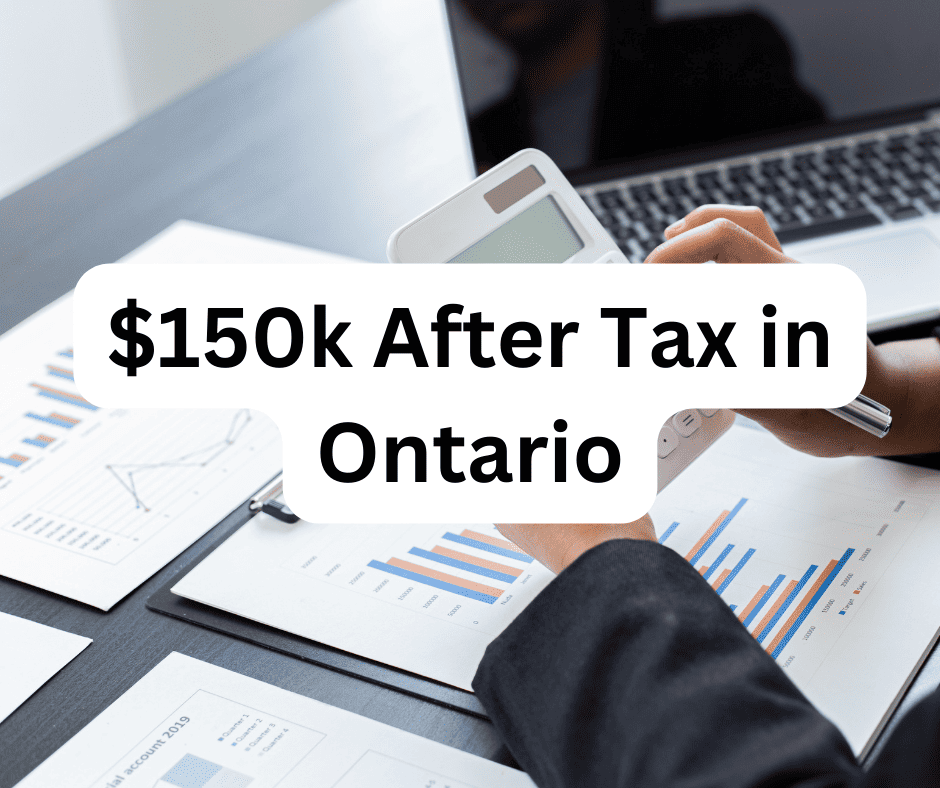Tax Rates and Take Home Pay
An individual earning $150,000 in Ontario would face the following tax rates in 2023:
- Federal tax rate: 26%
- Ontario provincial tax rate: 11.16%
- Combined federal + provincial marginal tax rate: 37.16%
After taking into account tax deductions and credits, the average total tax rate would be approximately 30%, meaning the take home pay would be around $105,000 annually or $8,750 per month.
Specifically, based on the 2023 tax brackets and rates in Ontario, the taxes owed on $150,000 of income would be calculated as:
- Federal taxes:
- 15% on first $53,359 = $8,004
- 20.5% on next $53,358 = $10,938
- 26% on remaining $43,283 = $11,254
- Total federal tax = $30,196
- Ontario provincial taxes:
- 5.05% on first $49,231 = $2,487
- 9.15% on next $49,232 = $4,506
- 11.16% on remaining $51,537 = $5,752
- Total Ontario tax = $12,745
- Total taxes = $30,196 + $12,745 = $42,941
- After tax income = $150,000 - $42,941 = $107,059, or ~$105,000 after rounding
So the take home pay on $150,000 in Ontario would be approximately $105,000 per year after federal and provincial income taxes.
Deductions
The main tax deductions that would apply to an individual earning $150,000 in Ontario would include:
- Registered Retirement Savings Plan (RRSP) contributions - up to 18% of earned income from the previous year can be contributed, with a maximum dollar limit of $29,210 for 2023. RRSP contributions are deductible and lower taxable income.
- Canada Pension Plan (CPP) contributions - mandatory contributions are 4.95% up to $64,900 of income in 2023. This equals $3,214 in maximum CPP contributions.
- Employment Insurance (EI) premiums - mandatory premiums are $1.87 per $100 of insurable earnings up to $60,300 for 2023, resulting in maximum contributions of $1,129.
Other common deductions like child care expenses, union dues, moving expenses, and certain employment expenses could also apply depending on the individual's personal situation.
Comparison to Other Provinces
Compared to other provinces, Ontario has medium personal income tax rates:
| Province | Tax Rate on $150,000 |
|---|---|
| Alberta | 39.00% |
| British Columbia | 43.70% |
| Manitoba | 46.40% |
| New Brunswick | 53.30% |
| Newfoundland and Labrador | 51.30% |
| Nova Scotia | 54.00% |
| Ontario | 37.16% |
| Prince Edward Island | 51.37% |
| Quebec | 48.22% |
So Ontario has lower total tax rates on $150,000 of income compared to the Atlantic provinces and British Columbia, but is higher than Alberta, Saskatchewan, and Quebec.
Some reasons why Ontario's taxes are moderately high include:
- Higher health premiums and payroll taxes like EI and CPP relative to some western provinces
- Higher provincial tax rates than Alberta and Quebec
- Harmonized Sales Tax (HST) of 13%, adding higher sales taxes than western provinces
On the other hand, Ontario does not have the highest top marginal tax rates compared to some eastern provinces. It also has lower retail sales taxes than B.C. and the Atlantic region.
Is $150,000 a Good Salary in Ontario?
Yes, $150,000 per year would be considered an excellent salary in Ontario. Some key points:
- It is nearly 2.5 times higher than the average individual income in Ontario of around $62,050 per year
- Combined with the take home pay of ~$105,000 after taxes, it provides significant spending power and savings potential
- The top 10% of income earners in Ontario make over $115,000 per year, putting $150,000 well above average
- It is enough income to comfortably afford housing, living costs, leisure activities, and travel in most Ontario cities while saving for retirement and other financial goals
So in summary, $150,000 per year would provide a very comfortable lifestyle in Ontario, even after the moderately high income taxes. It puts earners well into the top income brackets provincially and federally. Individuals or households earning this level of income have high levels of discretionary spending available relative to average Ontarians.

